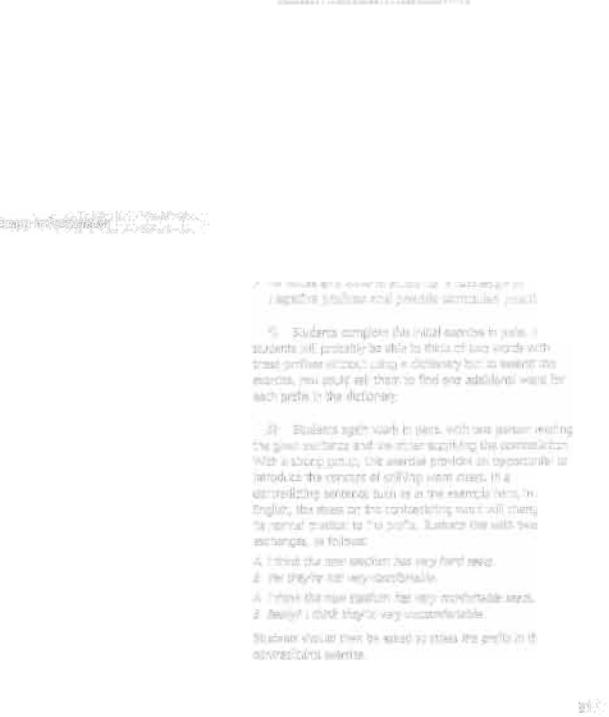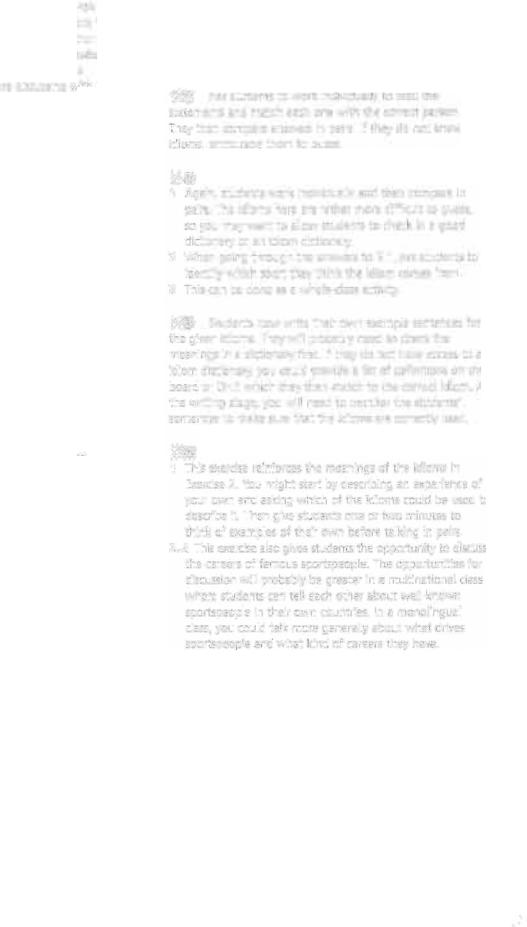
CAE Gold TB
.pdf


l ' NIT;'; Thrills and skills
3Ask students to work individually to match the meanings of the prefixes to the correct sentences and then compare in pairs.
4Students now work in pairs to decide on the correct prefixes and write example sentences.
ANSWERS
Ex. 1 sample answers
unfortunately/unhappy, dishonest/disconnected, immobile/impossible, illegible/illegal,
irrationa I/ irresistible
Ex. 2
1I think it'sirrelevant.
2I think they were illogical.
3I think he seemed immature.
4I think they are more disobedient.
5I found it unbelievable.
Ex. 3
1 |
b) |
2 |
h) |
3 e) 4 g) 5 c) 6 j) 7 a) |
8 |
d) |
9 |
i) |
10 f) |
Ex. 4
postgraduate/undergraduate reinstate anticlockwise misunderstand understatement/ overstatement underactive/overactive/reactive
~ Photocopiable activity 5 Prefixes pp.162 and 163
Use of English: word formation (Part 3)
p.58
Aim:
•to provide practice in completing an exam-style word-formation exercise
1
1The word counterfactual is itself an example of a word whose meaning might be inferred from the prefix. Prompt students to guess the meaning by giving other examples of words with the prefix counter or contra such as counterargument or contradict.
2Students now read to find out the meaning of counterfactual as explained in the text. Discuss whether they think it is a true description of how people think.
2 Studenrs now complete the word-building exercise either individually or in pairs . When checking the answers, emphasise that they must be exactly correct, with correct spellings and the plural 's'on numbers 3 and 8.
3
1If students find it difficult to relate the two types of thinking to specific people, you could just ask them to provide further examples of situations in which people are likely to think in a conterfactual manner. Receiving exam grades or passing or failing exams are an example that students could probably relate to.
ANSWERS
1 |
closeness |
2 |
satisfaction |
3 |
medallists |
4 |
frustrating |
|
5 inactivity |
6 |
unwise |
7 |
powerful |
8 |
adjustments |
9 uncomfortable |
|
10 rewrite
Speaking: agreeing and adding information (Parts 3 and 4) p.59
Aims:
•to practise discussing possibilities and reaching a decision
•to introduce phrases for expressing partial disagreement or introducing additional ideas
1Students look at the task and suggest some ideas about why the different possibilities would be effective.
2
1Students now listen to a discussion on this topic. For the first listening they should concentrate on understanding the content and note down the most important points. At the end of the listening they compare in pairs.
2Students listen to the discussion a second time to focus on the phrases for introducing additional points and for expressing disagreement. You may play the discussion all the way through first to see how many students can pick out the expressions, and then repeat it, pausing the recording after each relevant phrase. List the phrases on the board as you go through, then ask students to suggest any other phrases which could be used.
~Recording script p.96
3 Students now complete the speaking task in pairs. Set a time limit of about five minutes for them to reach a final decision.
32



ANSWERS
Ex. 2
2
-what you and your friend have done together
-reasons why you like your friend
-informal or colourful language
Ex. 3
1
Irrelevant sentences:
She is a good friend of mine and we have been at school together for most of that time.
She enjoys reading and is particularly keen on science fiction, which she reads all the time.
2
1 courteous 2 |
accustomed to |
3 proficient at |
|
4 In addition |
5 In the past |
6 |
at a high level |
7 consequently |
8 therefore |
9 |
invest |
10 I can highly recommend her for the position
Ex. 4
Para. 1: present
Para. 2: + her character; present perfect/present Para. 3: skills and qualifications; present/past! hypothesis
Para. 4: Future plans
Para. 5: recommendation; hypothesis
l'XIT:; Thrills and skills
UNITS 1-5 Progress test p.65
The progress test section follows the format of CAE Paper 3 (Use of English). The exercises could be set for homework or done as further practice in class.
ANSWERS
Ex. 1
1 D 2 B 3 C 4 A 5 B 6 B 7 C 8 A
9 |
C 10 B 11 D |
12 A |
|
Ex. 2 |
|
|
|
13 |
where 14 of |
15 |
had/needed |
16 |
lack/want 17 |
at |
18 If |
19more/greater/further
20While/whilst!(al)though
21 |
much |
22 not 23 what 24 all 25 ought |
26 |
like |
27 well |
Ex. 3
28 |
handsets |
29 |
typically 30 |
upgrading |
|
31 |
consumer |
32 |
emotional |
33 |
unwilling |
34 |
donation |
35 |
reconditioned |
36 affordable |
|
37 |
reliable |
|
|
|
|
Ex. 4
38 saving 39 apply 40 flat 41 study 42 rare
Ex. 5
43gave a beautiful performance
44led to an/the increase in/led to the increasing
45who has organised
46it that makes
47I would have been able
48cross the finishing line
49no means unusual
50had not gone out so
35
UNIT
6 Family ties
Reading 1 p.68
Aim:
•to give practice in reading techniques (skimming and scanning, followed by careful reading) for Paper 1,
Part 4
1Students work in pairs to make a list and then classify the issues. Teenage students or students who are the parents of teenage children may be able to give good examples but the topic needs careful handling as personal issues may emerge.
2Students skim the text to answer question 1, within a time limit of one minute. Before they attempt 2.2, remind them of the procedure for answering this type of exercise, (read the questions first carefully, then scan the text for the answers one by one). You may need to teach the verb counter.
If appropriate to the class, the topic could be personalised with students discussing incidents from their own life in pairs (e.g. talk about a time when they won an argument as a teenager, were allowed to so something for the first time, or not allowed to do something that their friends were).
ANSWERS
1 D 2 A 3 C 4 B 5 A 6 D 7 D 8 C
9 B 10 B
Listening 1 p.69
Aims:
•to give practice in listening for attitude and opinion
•to give practice in making suggestions and agreeing and disagreeing in spoken English
1Give students time to read the questions carefully for the first extract and then play the recording. They compare answers in pairs before listening again. Follow the same procedure for extract two.
~Recording script p.97
2
1Do the first part about rules for parents together and write the rules that students suggest on the board (e.g. do not
argue in front of the children). Students then work in groups to decide on rules for siblings and grandparents.
2Different groups now join up to compare rules and decide on the best four. Again, you may need to consider students'ages and backgrounds when forming the groups. The topic could be consolidated by asking students to write a report on their discussion (e.g how they agreed on the rules, what rules they agreed on and how they think the rules will work). This could form the basis of a presentation made by each group to the class. Give each group two or three OHTs or sheets of paper which they use to make visuals to illustrate the rules. Ask the class to suggest some ways to ensure that the rules were kept (e.g. monthly family meetings). Alternatively, it could be given as a report-writing exercise for homework.
ANSWERS
Ex. 1
1 C 2 A 3 C 4 B
Grammar 1: hypothetical meaning - wish
p.70
Aim:
•to revise and extend students'knowledge of structures used after I wish and the use of unreal past after it's time, would rather and second conditional structures
1 Students do this exercise individually or in pairs. Go through answers, checking that the class understands the use of the past simple after would rather and that it's time does not refer to the past. At the end, ask which sentences hypothesise about an imaginary present or future (1,2,3,7,
8)and which one refers to an imaginary past (6). Finally, students work in pairs to match each sentence to a rule.
2
1Use the text first to practise skim reading by asking students to look through the text quickly to find the family relationship. You could also ask what difficulties each person mentions. Then students choose the correct verb forms for their text.
2Students summarise the content of the texts to each other and check each other'sverb forms.
36



2
'whichhas been' 2 'was' 3 'whowere'
Ex. 2
1 there 2 so 3 one 4 not 5 It 6 neither 7 that/it
Ex. 3
1 visit her cousin |
2 they feel 3 she is leaving |
4 to borrow 5 |
laptop 6 emailed me 7 call me |
8 get annoyed |
|
Ex. 4
1I can'tafford it/afford to.
2get a new one
3I ae will.
4it'sKaren'seRe.
5Do you think so?
6I expect it will/I expect so
Ex. 5
It is well-documented that relationships between children and their parents fundamentally affect Ei:lilElreR'stheir behaviour as adults. But now the importance of these/such relationships eet.....eeR Ei:lilElreR aREl ti:leir f3areRts is being challenged as new research shows that a child'srelationship with its siblings may have a more important effect on
a (i:liIEl'stheir future adult behaviour. Psychologist Francine Klagsbrun says: 'Our
relationship with our siblings is unmatchable. GtH:
~ They are there whether we like ol:Jr sieliR!:Js them or wi:leti:ler we ElOR'tlil<e ti:leFfl not. Other relationships change - parents die, friends drift away, marriages break up, but the relationship with siblings carries on and the memories of life that has been shared with ol:Jr sieliR!:Js them remain with us long after childhood has ended.'
Ex. 6
1 c) 2 a) 3 d)
Listening 2 p.7S
Aims:
•to give practice in understanding speakers'opinions and attitudes and then specific details
•to give practice in inferring meaning from context
1
1, 2 Students can either complete this activity individually and then compare their ideas in pairs, or they can discuss the adjectives in groups from the beginning.
3These points can be discussed as a brief whole-class activity.
eXIT 6 Family ties
2
1Students read the four statements and listen to the recording. They discuss their ideas in pairs before checking the answers.
2Students now listen again and make notes on specific details, then compare the points they have noted in pairs. Then play the recording again, pausing as necessary, to go through the answers. You can also check some vocabulary such as tomboy.
3 Follow a similar procedure to the first listening text
4 Ask students to work together to try to work out the meaning of the highlighted words, or tell each other if they know the words already. You may wish to replay the final section of speaker two before checking the answers.
~ Recording script p.98
5 Students discuss these questions briefly in pairs before feeding back. You could ask each pair to tell you two similarities and two differences.
ANSWERS
Ex. 2
1
1 disagree 2 agree 3 disagree 4 disagree
2
a)the length of her finger
b)her love of mechanical toys, dirt, etc.
Ex. 3
1
1 |
agree 2 disagree 3 agree 4 agree |
5 |
disagree |
2 |
|
a)mixing with the wrong crowd, getting into trouble/fights
b)he loves being thrown up in the air, risk-taker/aggressive/adventurous
Ex. 4
1main income earner
2spoil/over-indulge
3made fun of/persecuted
~Photocopiable activity 6 Birth order quiz pp.164 and 165
39
